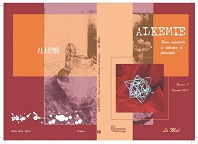La rédemption et le mal
Salvation and Evil
Author(s): Ciprian Constantin MihaiSubject(s): Philosophy
Published by: Classiques Garnier
Keywords: Salvation; evil; philosophy; scienc; magic; duality; being; knowledg;; living; good
Summary/Abstract: This text tries to underline the major meanings of the salvation and evil beginning from Nae Ionescu’s philosophy, especially his course on Faust – the matter of salvation in Faust of Goethe –, the Romanian philosopher being one of the most important figure of the intellectual elites during the Romanian interwar space, an outstanding personality that created the generation of Mircea Eliade, Vulcanescu, Cioran, Noica et alii. The matter of salvation has two essential meanings : a transcendental meaning and a spiritual meaning, inside the human being. Nae Ionescu lays stress on dual conception of Goethe : the evil as the necessity of being is not present at Goethe; there is the presence of evil as the absence of good – privatio boni (the Augustinian doctrine). The duality of Goethe’s feature is the reflection of two sorts of solutions : first of all, the knowledge and second of all, the living. In fact, this is sign of knowledge during the Renaissance as an identity between science and magic. In opposition to Wagner as the type of the non‑tortured scientist, Faust is the metaphysician overwhelmed with sorge (care). Oscillating between salvation – as the possibility of regaining the Absolute – and evil, Faust finishes by obtaining his "Das ewig Weibliche"
Journal: ALKEMIE. Revue semestrielle de littérature et philosophie
- Issue Year: 2011
- Issue No: 08
- Page Range: 44-55
- Page Count: 10
- Language: French

